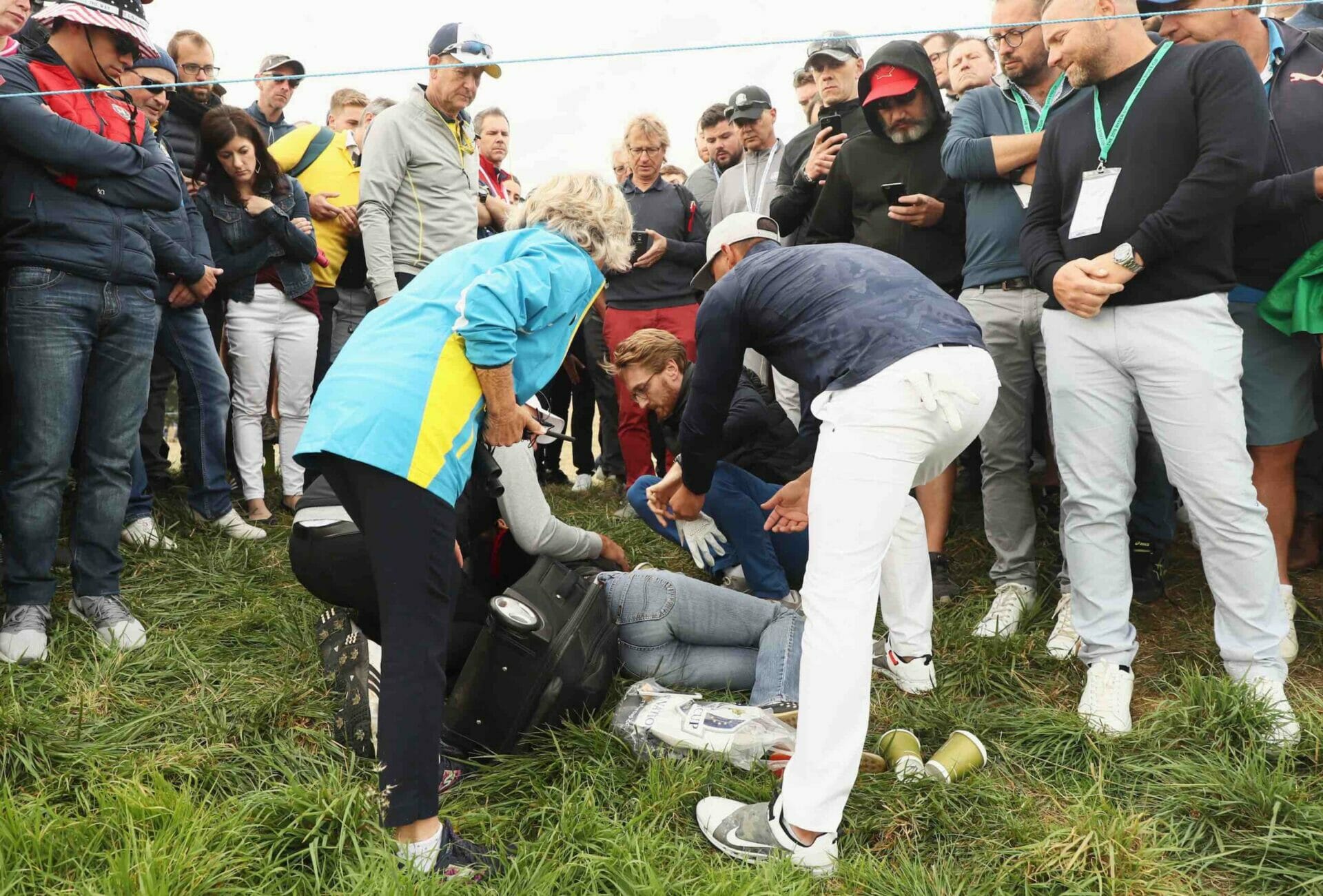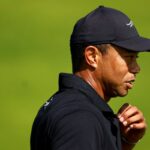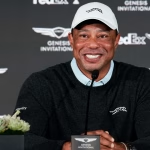Fans of the hit TV cop show ‘Hill Street Blues’ which ran for around six years in the early Eighties will never forget one of the regular punch lines – “Hey, let’s be careful out there.”
These were the words uttered at the end of each morning roll call by Sergeant Phil Esterhaus, played by actor Michael Conrad, as his comrades prepared for another day fighting crime on the streets of New York. Perhaps our Tour heroes could do with a little piece of Sergeant Esterhaus’ wisdom before starting their rounds.
They are, whether they realise it or not, in charge of potentially lethal weapons, i.e golf balls, and a mis-directed shot can have dire consequences for spectators who take a direct hit. The consequences can range from life-changing to bad injuries to a bit of a bruise, but it’s no joke to be struck by a golf ball, especially one powered by a top class player.
Brooks Koepka, Rory McIlroy, Dustin Johnson, Tyrell Hatton, Ernie Els, Phil Mickelson, Shane Lowry – these are just a few of the many Tour pros whose errant shots have struck spectators.
In the case of Koepka, it could hardly have been worse. The American’s second shot to the 14th hole in the Friday Fourballs at the 2018 Ryder Cup went wide of his intended target, and hit a woman named Corine Remande. She ended up losing the sight of an eye and threatened to sue the Ryder Cup organisers.
Koepka was devastated at the consequences for Ms Remande but what could he do? Obviously the last thing on his mind was hurting anyone, and tickets for professional tournaments usually carry a warning in the small print that spectators attend these events at their own risk.
In fairness, the fans who happen to be in the wrong place at the wrong time are usually stoic and forgiving when hit by a professional’s golf ball. Any kind of a hard impact will cause shock, and a ball landing in the face or head area requires at the very least medical inspection and treatment if necessary.
The nearest I came to one of these situations was at The Open in Royal Birkdale two years ago. Colleague Philip Reid of the Irish Times and I were standing inside the ropes above the 9th green on the Friday when suddenly a ball struck by Dustin Johnson clattered into Philip’s cheekbone and dropped down, rolling off my foot.
No warning. No time to react. Just, bang! And immediately the question was: how badly was Philip hurt? Well, he was shocked, certainly. Sore, too. But by the grace of God, the cheekbone took the hit. An inch or two higher and it would have been the temple, with who-knows-what consequences.
Johnson was apologetic, but not overly so. “Sorry, man,” he said, and dug out a golf ball and signed it before moving on to play his shot. After the medics checked him out, Philip was good to go, sore, with slight bruising, but he had a story to tell and the golf ball as a souvenir.
Still, this was a horribly close call, and, like American Kyle Stanley at The Open in Royal Portrush, there was no shout of “Fore” from Johnson after he hit the shot. Stanley hit two spectators in separate incidents during his Friday round, and never shouted a warning. His behavior resulted in playing partner Robert MacIntyre giving him a tongue lashing for his silence.
This is very much an American pro habit, and it’s just so annoying. Their attitude tends to be: “I’m too far away for anyone to hear me shout.”
The most they seem willing to do is stick out an arm in the direction the ball is travelling – a silent signal, potentially deadly, wholly inadequate and completely wrong.
If a Kyle Stanley or a Dustin Johnson shouts “Fore” the cry will be picked up by the spectators and they will duck and shout, alerting people further down the line. Anyone who knows anything about golf will then immediately cover their heads and duck down. Better to be safe than sorry, and it could save an eye, or a life.
I was not impressed with Kyle Stanley’s dismissive comments about the actions of MacIntyre in taking him to task for failing to shout a warning at Royal Portrush. Stanley came across as condescending, in no way contrite, and sounding as if he had no intention of changing his ways, despite Tour instructions to players to shout “Fore” when they hit a shot off line that could threaten spectators.
“He’s a young player. I’ve been out here awhile. So I don’t feel the need to be schooled on the Rules of Golf, or what to do when I hit a shot off line. That’s my perspective on it. I don’t know, maybe this is a good learning experience for all,” said Stanley.
Well, mate – it does appear you need to be schooled on what to do when you hit a shot off line. Hopefully that would be your takeaway from The Open. It might help if the PGA Tour, European Tour, LET, LPGA Tour, and all the other Tour ruling bodies could bring in a rule that a player be fined heavily if he or she fails to shout “Fore” in those situations. That might focus a few players on literally making the right call at the right time.
The wonder of it all is that no spectator has died from being hit by a golf ball at a Tour event. Thanks be to the Golfing Gods for that, and long may it continue.
























Leave a comment